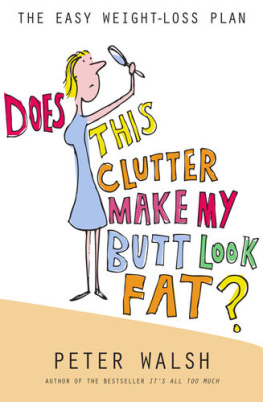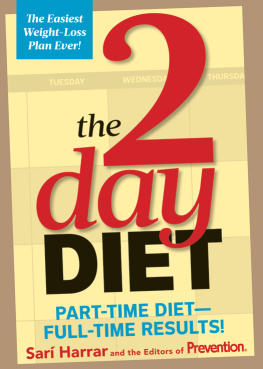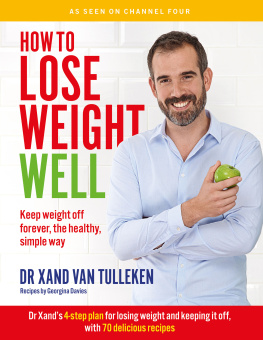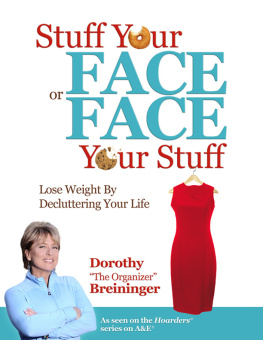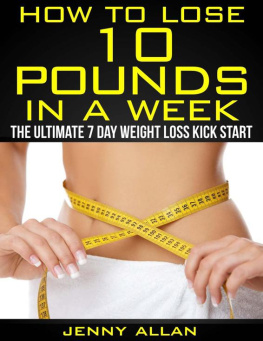
This book is intended as a reference volume only, not as a medical manual. The information given here is designed to help you make informed decisions about your health. It is not intended as a substitute for any treatment that may have been prescribed by your doctor. If you suspect that you have a medical problem, we urge you to seek competent medical help.
Mention of specific companies, organizations, or authorities in this book does not imply endorsement by the author or publisher, nor does mention of specific companies, organizations, or authorities imply that they endorse this book, its author, or the publisher.
Internet addresses and telephone numbers given in this book were accurate at the time it went to press.
This book is being published simultaneously by Rodale Inc. as Cut the Clutter, Drop the Pounds.
2015 by Peter Walsh
All rights reserved. No part of this publication may be reproduced or transmitted in any form or by any means, electronic or mechanical, including photocopying, recording, or any other information storage and retrieval system, without the written permission of the publisher.
Book design by Christina Gaugler
Photographs by Thomas MacDonald / Rodale Images
Library of Congress Cataloging-in-Publication Data is on file with the publisher.
ISBN-13: 9781623364847 trade
eISBN: 9781623364854

We inspire and enable people to improve their lives and the world around them.
rodalebooks.com
To those whove always helped me keep my perspective:
Christine and David
James and Vicky
Julie
Kay and Paul
Kelvin
Michael and Gloria
Steve and Amanda
CONTENTS
INTRODUCTION
How Did I Get This Way?
I ts a reasonable question to ask when you see a vacation photo that gives you a pang of shock at your appearance.
You may have a photo like that. Youd been happily going along, ignoring the deep indentation that the waistband of your jeans was leaving in your skin (so much for relaxed fit) or the appearance of new numbers or letters in your bra size.
But theres no getting around this photo, which looks nothing like the image you see in your mind. Somehow, at some point, you became too large for your comfort. Now you know the truth, but you arent sure what to do about it.
How Did I Let My Home Get This Way?
Another common question. As with your body, the state of your household can sneak up on you. Sure, you know that things are a little messy. But when your aunt arrives at your door unexpectedlyor your pastor, or the new neighbors, or the air conditioner guyyou suddenly see the place through that persons eyes. You didnt really let yourself think about it before, but now you cant avoid it: Your home embarrasses you.
So how did you get here? Given the environment we live in, Id say a more useful question is this: How can your body and home not get to this point?
If youre an Americanor have the good fortune to live in a similarly modernized countryyoure surrounded by abundance. Advertising messages whisper, plead, and shout at you all day long to buy, buy, buy. Buy something to eat! Buy something to put in your hair! Buy something to put in your kitchen cabinet! Clever marketing tells you that your life is good, but if youll buy this one thing, itll be great! Or, more pointedly, that you can have the life you want if you just buy the right things.
Youre also surrounded by easy choices. Why dirty your pots and pans when you can go out to eat and someone will make your meal for you? Hold that thought. Why take an entire hour to eat at a sit-down restaurant when you can roll your car through the drive-thru? Wait... even better: Order a sub sandwich from your smartphone and have it delivered to your home. You dont even have to get up.
On that note, why spread your own mulch when the landscaper who left a flyer in your mailbox will do it for you? Why stand up and go for a jog when youre comfortable sitting on the couch? Why go to the hassle of throwing out a bunch of stuff when you can just stash it in the garage and park your car outside?
These have all become perfectly normal decisions for many people.
Thats not to say that Americans dont like to work. In 2013, the average American worker put in 1,788 hours on the job. We spent more time working than our counterparts in France (1,489 hours), England (1,669 hours), and even Germany (1,388 hours). And Americans receive less paid time off, in the form of vacation days and paid holidays, than people in many other nations. Surveys have found that many workers cant even tear themselves away from the job to take all their vacation days over the course of the year.
If youre putting in long hours at the officethen juggling work issues over your phone and computer in the evening while youre trying to raise a familyits not surprising that you would look for shortcuts whenever you can. If society offers a way for you to eat faster, handle a chore more quickly, or feel better about yourself for just a few bucks, how can you resist? Everyone else seems to be doing it.
So you wind up living like the average, everyday people around you. You buy a lot of stuff, and you take things easy when you can. Most days, it wont occur to you to examine the effect these normal choices are having on your life.
Perhaps you dont notice that your pants size has grown because you see other people your size every day. If you pluck three American adults out of the crowd at random, only one will have a normal, healthy weight. The second will be overweight. The third will be obese, or in other words, extremely overweight. When two-thirds of those around us are heavy, then heavy becomes the new normal. The one whos at a healthy weight is unusual.
Manufacturers are adjusting their products to keep up with the nations growing girth. The world around you now offers extra-large ambulances and stadium seats and movie theater seats and operating tables and casketsall built to be extra spacious and strong to accommodate the typical modern user. Like the ever-growing portion sizes at restaurants, these subtle enlargements in your surroundings seem normal now. They can reinforce the idea that theres no reason to change your eating habits, your exercise habits, or your size.
And just as you might not notice your growing weight because your surroundings mask it, you may not notice how overstuffed your home has become. Your friends and neighbors, and your counterparts in other affluent countries around the world, tend to have a lot of stuff crowding their homes and their lives, too. The portion of American adults who meet the criteria of hoarding disorder is now estimated to be a little over 5 percent. This means that every year, about 23 times more people in the United States have a hoarding problem than have a heart attack!
Im convinced that the number of Americans who dont meet the definition of hoarding, but who have so much household clutter that its hampering their lives, is much, much higher. If you doubt me on this, I challenge you to drive down any suburban American street on a sunny spring day when garage doors are often up. How many garages do you see in your neighborhood that are so overstuffed with clutter that its impossible to park a car in them?








